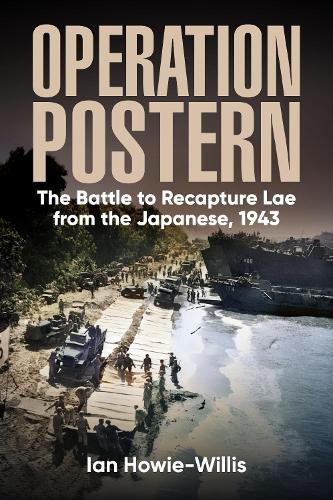
Operation Postern
(Paperback)
Publishing Details
Operation Postern
By (Author) Ian Howie-Willis
Big Sky Publishing
Big Sky Publishing
29th November 2023
Australia
Classifications
Non Fiction
Land forces and warfare
Military history
Military and defence strategy
Physical Properties
Paperback
480
Width 153mm, Height 234mm
Description
Japanese troops seized and brutally occupied New Guineas capital, Lae, for 18 months until 16 September 1943. That day Australian soldiers retook the town against fierce resistance. Defeated, and after suffering huge losses, 8000 Japanese soldiers fled across the formidable 4000-metre mountains behind the town ; 2000 died on the nightmare trek.
Operation Postern, the recapture of Lae from the Japanese, was a turning point in the Pacific War of 19411945. Until then, the Japanese believed they could retain the New Guinea mainland, yet after Postern they retreated continually, making possible the success of all subsequent Allied campaigns in the South-West Pacific theatre.
The Allied victory came at a high price over 2000 casualties within a fortnight. Japanese losses were almost four times that many. How many Papua New Guinean village people died during the fighting is unknown, but very many did.
Previous military histories have marginalised the Papua New Guineans, rarely referring to the horrific impact of the war on their villages. Typically, the campaign histories depict the Pacific War as a two-sided contest between the Allies and the Japanese. Dr Howie-Willis breaks new ground, amply demonstrating how the village communities on whose lands the campaign was fought were always an essential third party to the conflict.
Eight decades later, Operation Postern retells and reinterprets the crucial battle that was codenamed Operation Postern.
Author Bio
Dr Ian Howie-Willisis an independent professional historian. The author of 20 books, he is the Historical Adviser to St John Ambulance Australia. His previous book wasAn Unending War: The Australian Armys struggle against malaria, 18852015(Big Sky Publishing, Sydney, 2016). He grew up in Melbourne and lived for ten years in Papua New Guinea and England before settling in Canberra in 1975. He completed his university training with a PhD in history from the Australian National University. He has been married to Margaret Willis (ne Vale), a retired school principal, for 58 years. They have three married children and seven grandchildren.
